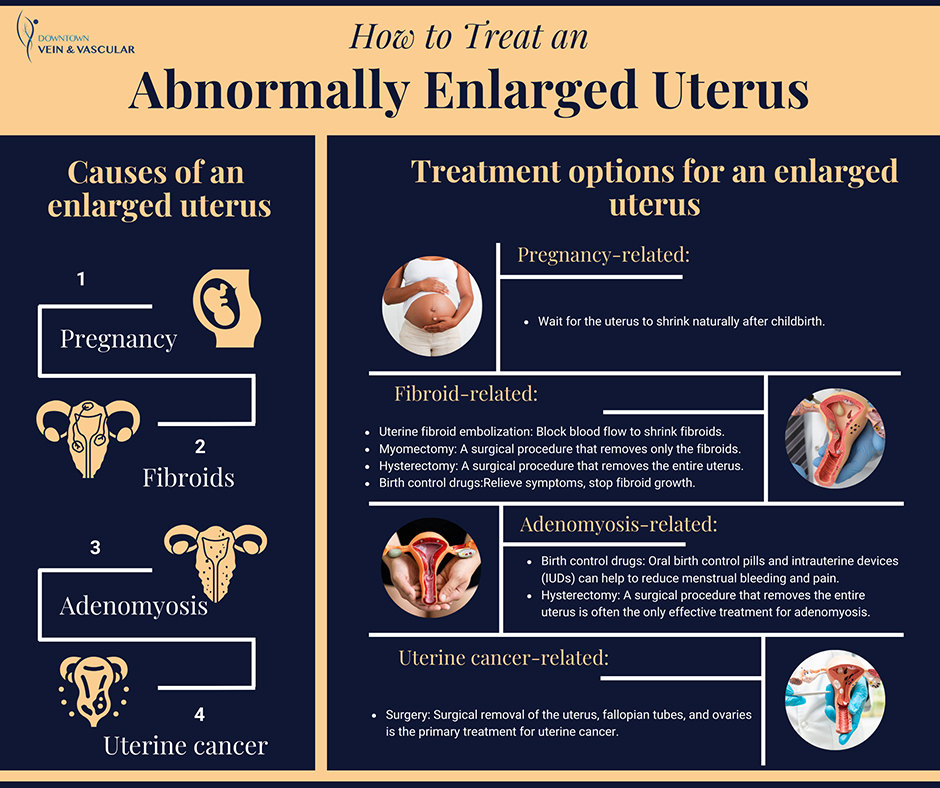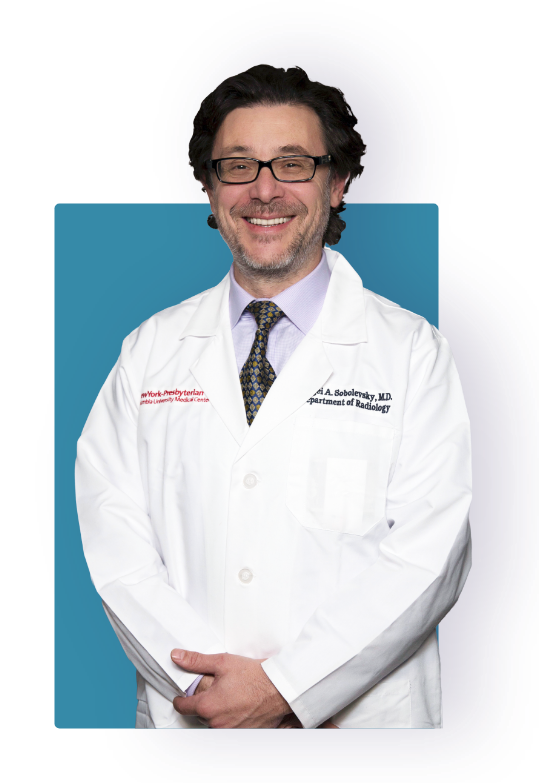An enlarged uterus due to uterine fibroids or adenomyosis leads to significantly unpleasant symptoms. While your uterus is designed to enlarge to grow a fetus, it shouldn’t grow because of abnormal growths or tumors. Fibroids are the most common type of unwanted uterus enlargement, but they’re non-cancerous and treatable. When you wonder how to reduce an enlarged uterus in size, call on top fibroids experts to provide the best treatment in Brooklyn at the Downtown Vein & Vascular Center.
What Is an Enlarged Uterus?
The average woman’s uterus is two and a half inches wide by three to four inches tall — roughly the shape of an upside-down pear. A uterus that has expanded beyond normal size is considered enlarged. Having an enlarged uterus may be an indication that you are pregnant or have an underlying medical condition.
There aren’t always visual indicators that you have an enlarged uterus. In many cases, you can see the uterus protruding from the lower abdomen as it expands. Additional symptoms from an enlarged uterus include pelvic pain, weight gain and heavy bleeding.
While pregnancy is the most common cause of an enlarged uterus, other causes, such as fibroid conditions, may be responsible. If you notice swelling in your lower abdomen or changes in your menstrual cycle, you may have uterine fibroids. The qualified doctor at the Downtown Vein & Vascular Center Sergei Sobolevsky offers comprehensive enlarged uterus treatment for some conditions causing an enlarged uterus in state-of-the-art Brooklyn facilities.
What Causes an Enlarged Uterus?
If you’re pregnant, the baby grows in the womb and causes the uterus to expand. Just before birth, a watermelon sized bump in your lower abdomen reveals the extent to which a uterus increases in size during pregnancy. If you’re not pregnant, other causes of an enlarged uterus include:
- If you notice you have a bulging abdomen, pelvic pain and heavy bleeding, your enlarged uterus may be caused by fibroids. Fibroids are lumps of tissue that occur both inside and outside of the uterus. Some fibroids are small, but some can grow to weigh several pounds.
- Adenomyosis is a condition in which tissue from the uterine lining invades the muscle in the wall of the uterus. The uterus in women with adenomyosis can expand to double or triple the size of a normal uterus.
- Reproductive cancers. A uterus may enlarge due to a malignant tumor. It is extremely important to diagnose a cancer in your uterus or cervix, and the earlier, the better for a definitive treatment. A late diagnosis of reproductive organ cancers is associated with a poor prognosis.
Tell your doctor about any symptoms of an enlarged uterus that you have so they can better diagnose what’s causing your enlarged uterus and determine the best treatment plan for you.
Dr. Sobolevsky provided expert advice and treatment during my spider vein procedure. He was professional, friendly, and made me feel at ease throughout the process. I would highly recommend him to anyone seeking vein treatment.
How Can I Treat My Abnormally Enlarged Uterus?
An enlarged uterus caused by pregnancy begins to shrink naturally after childbirth. If your uterus is enlarged because of the presence of fibroids or adenomyosis, a medical intervention may provide relief. Enlarged uterus treatment options are available for fibroid treatments. Various techniques for how to reduce an enlarged uterus due to fibroids include:
- Uterine fibroid embolization. Uterine fibroid embolization is a common enlarged fibroid uterus treatment. This non-surgical procedure limits blood flow to the fibroids, causing them to shrink.
- Myomectomy or hysterectomy. You may be advised to have the fibroids removed. A myomectomy is a surgical procedure that removes only the fibroids, whereas a hysterectomy is a surgical procedure that removes the entire uterus.
- Birth control drugs. Oral birth control pills and intrauterine devices (IUDs) relieve symptoms of fibroid pain by stopping the growth of fibroids.
Relief from symptoms of an enlarged uterus is achievable. Discovering the cause for your enlarged uterus is a crucial step toward freedom from its uncomfortable symptoms.

What Are the Risks of Not Getting Treatment?
The causes of an enlarged uterus vary. Your enlarged uterus may be an indication that you have fibroids, adenomyosis or reproductive cancers. If fibroids go untreated, they sometimes lead to complications, including:
- Infertility. While rare, untreated fibroids can lead to the inability to bear children.
- Loss of pregnancy. In some cases, fibroids lead to a miscarriage.
- Pelvic discomfort and pain. Symptoms associated with an enlarged uterus due to fibroids or adenomyosis include cramping, bleeding, pain during sex, frequent urination and pelvic pain. These symptoms may continue and worsen if your enlarged uterus goes untreated.
- In some women, heavy menstrual bleeding or vaginal bleeding between normal menstruation due to uterine fibroids or adenomyosis may lead to severe blood loss, causing extreme chronic fatigue and requiring blood transfusions.
Help is available to identify, evaluate and treat an enlarged uterus. If you notice a swelling of your lower abdomen, feel pelvic pain or experience heavy uterine bleeding, you may have an enlarged uterus caused by fibroids. Enlarged fibroid uterine treatment is waiting for you at the Downtown Vein & Vascular Center, serving all Brooklyn. Contact Sergei Sobolevsky, MD and his caring team of professionals to begin treatment today.

I am Dr. Sergei Sobolevsky, a leading specialist in endovascular medicine. Having performed over 25,000 procedures throughout my career, I bring decades of experience in vascular and interventional radiology to my practice. I obtained my Doctor of Medicine (MD) degree from the University of Colorado School of Medicine in 1997 and completed my specialty clinical training in vascular and interventional radiology at Harvard University.
My dedication to excellence in patient care has been recognized through accolades such as being named a Castle Connolly Top Doctor and inclusion in the Top Doctors New York Metro Area lists for 2020, 2021, 2022, and 2023. With licenses in multiple states, I have also shared my expertise through presentations at various institutions in the US and abroad.
More About Dr. SobolevskyDowntown Vein Treatment Center
480 Court Street, Ste 101
Brooklyn, NY 11231
(718) 787-5559

